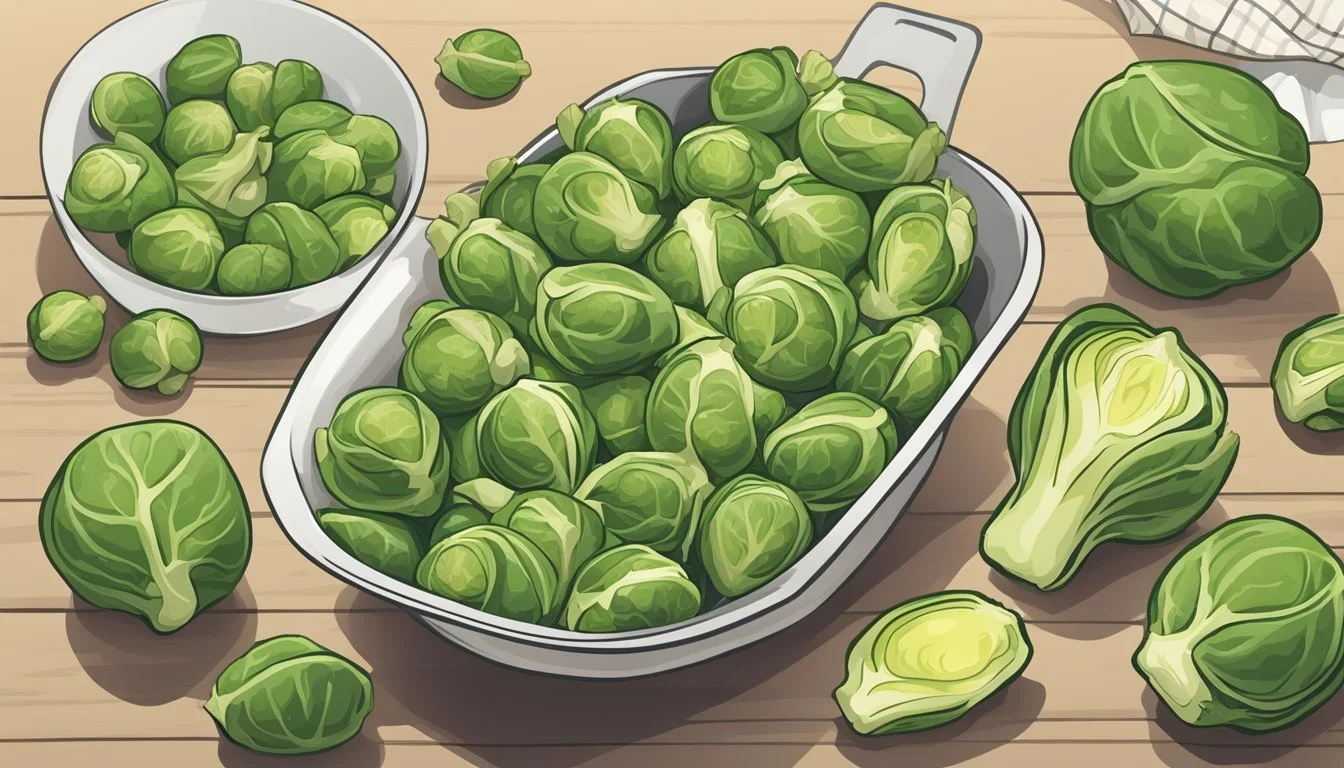What Are the Health Benefits of Brussels Sprouts?
Uncovering Nutritional Facts
Brussels sprouts, the small, leafy green buds resembling miniature cabbages, pack a substantial nutritional punch. Often featured in winter meals and renowned for their distinctive taste, these cruciferous vegetables are not only versatile in culinary use but also offer an array of health benefits. Rich in vitamins and minerals, they contain high levels of vitamin C and vitamin K, essential nutrients that play crucial roles in the maintenance of our health.
The nutritional profile of Brussels sprouts extends beyond vitamins, offering a noteworthy fiber content that supports digestive health. This fiber aids in promoting regular bowel movements and contributes to maintaining a healthy gut microbiome. As part of the cruciferous vegetable family, Brussels sprouts also possess compounds that have been associated with a reduced risk of certain cancers.
Furthermore, the antioxidants found in Brussels sprouts help combat oxidative stress in the body, which is implicated in the aging process and many chronic diseases. Their contribution to bone health should not be overlooked either, as the presence of calcium and vitamin K is vital for bone formation and may prevent the onset of osteoporosis. Their overall nutritional benefits make Brussels sprouts a valuable addition to a balanced diet aiming to support long-term health.
Nutritional Profile of Brussels Sprouts
Brussels sprouts offer a rich supply of vitamins and minerals, and they are a source of dietary fiber and macronutrients essential for a healthy diet.
Vitamins and Mineral Content
Brussels sprouts are particularly high in vitamin K, essential for blood clotting and bone health, and vitamin C, known for its role in immune function and skin health. They also provide a good amount of folate, which is crucial for DNA synthesis and repair. Additionally, these small but mighty vegetables contain vitamin A, important for vision and immune health.
The mineral content of Brussels sprouts includes calcium and potassium, which contribute to bone strength and cardiovascular health, respectively. They also contain modest amounts of iron and magnesium, which play a role in energy production and muscle function.
Macronutrients and Fiber
In terms of macronutrients, Brussels sprouts are low in calories, making them a weight-friendly food. They have a low fat content, with the existing fats being primarily polyunsaturated and monounsaturated, which are considered beneficial for heart health.
Brussels sprouts provide protein, albeit in smaller amounts when compared to other protein sources. However, they are still a valuable protein source for plant-based diets. They are composed of predominantly carbohydrates, including essential dietary fiber. The fiber content aids in digestion and can help maintain stable blood sugar levels. The sugar in Brussels sprouts is naturally occurring and minimal, which makes them a suitable option for a balanced diet.
Health Benefits Linked to Brussels Sprouts
Brussels sprouts, a member of the cruciferous vegetable family, offer a multitude of health benefits ranging from cancer prevention to digestive health. These nutrient-dense vegetables pack a significant punch in terms of antioxidants, fiber, and essential vitamins.
Cancer Prevention
Brussels sprouts are noted for their high content of glucosinolates, compounds linked to reducing the risk of various cancers. These glucosinolates are broken down to form bioactive compounds that help in detoxifying potentially harmful substances. Studies suggest a strong association between the consumption of cruciferous vegetables and a lower risk of several types of cancer.
Heart Health and Blood Clotting
The cardiovascular benefits of Brussels sprouts are attributed to their ability to regulate cholesterol levels and promote heart health. Rich in vitamin K, which is essential for blood clotting and preventing excessive bleeding, Brussels sprouts also help to maintain healthy blood pressure levels, potentially reducing the risk of heart disease.
Bone Health and Inflammation
High in vitamin K, Brussels sprouts support bone health by aiding in bone formation and reducing the risk of osteoporosis. Moreover, their anti-inflammatory properties, derived from the presence of antioxidants like vitamin C, help to reduce the risk of chronic inflammatory conditions, safeguarding bone density and overall bone health.
Digestive Health and Weight Management
The fiber content in Brussels sprouts supports digestive health by preventing constipation and promoting a healthy gut bacteria balance. This high-fiber quality may also aid in weight management by helping to regulate blood sugar levels and providing a sense of fullness, which can reduce overall calorie intake.
Suggestions for Preparing and Cooking Brussels Sprouts
Brussels sprouts offer versatility in cooking methods, each enhancing their distinctive flavor and preserving their nutritional benefits. This section explores different ways to prepare and enjoy these nutritious vegetables.
Roasting for Enhanced Flavor
Roasting Brussels sprouts is a method that brings out their natural sweetness and adds a crispy texture. To ensure even roasting:
Preheat the oven to 400 degrees Fahrenheit.
Trim and halve the Brussels sprouts, removing any loose leaves.
Toss them with olive oil, salt, and black pepper on a baking sheet.
Roast until they are golden brown, usually for about 20 to 30 minutes, stirring halfway through.
For additional flavor, consider incorporating garlic or a blend of spices such as rosemary or thyme before roasting.
Creative Recipes and Pairings
Brussels sprouts can be the star of many dishes beyond simple roasting. Creative pairings include combining them with:
Sweet elements like balsamic reduction or apples for a flavor contrast.
Bold ingredients such as bacon or strong cheeses for a hearty dish.
Grains or legumes to create a well-rounded meal.
They can also be incorporated into soups and stir-fries for extra fiber and a dose of Vitamin C.
Tips for Eating Raw and Steamed
While often enjoyed cooked, Brussels sprouts can also be eaten raw or steamed, offering a fresh, slightly bitter taste and crunchy texture. Here are some tips:
For salads, shred or shave the Brussels sprouts finely and dress them with a light vinaigrette.
Steamed Brussels sprouts should be cooked just until tender to retain their nutrition and flavor. Typically, steaming them for 6-7 minutes suffices.
Combine with other fresh salad ingredients or dress with a tangy lemon dressing for a nutritious side dish.
Frequently Asked Questions
Brussels sprouts are packed with multiple nutrients beneficial for overall health. This section addresses common inquiries about the health advantages of incorporating brussels sprouts into a diet.
What nutrients do brussels sprouts contain that benefit the skin?
Brussels sprouts are rich in vitamin C, an antioxidant that can support skin health by promoting collagen production and helping to protect skin cells from damage.
How can brussels sprouts aid in weight management or loss?
They are low in calories but high in fiber and nutrients, which can support weight loss by promoting feelings of fullness and reducing overall calorie intake.
What potential risks are associated with consuming brussels sprouts daily?
Eating brussels sprouts in excessive amounts may lead to an increased risk of bloating and gas due to their high fiber content. Individuals taking blood thinners should also monitor their vitamin K intake, as brussels sprouts are high in this nutrient.
How does the fiber content in brussels sprouts influence digestion?
The fiber in brussels sprouts helps maintain digestive health by promoting regular bowel movements and supporting a balanced gut microbiome.
In what ways are brussels sprouts considered a nutritious addition to a balanced diet?
Brussels sprouts offer essential vitamins and minerals like vitamin K, vitamin C, folate, and fiber, making them a nutrient-dense food that complements a balanced diet well.
What are the comparative health benefits of brussels sprouts versus other green vegetables?
Compared to other green vegetables, brussels sprouts are especially high in vitamin C and vitamin K. Additionally, they are part of the cruciferous vegetable family, which research suggests may have a role in cancer prevention.



